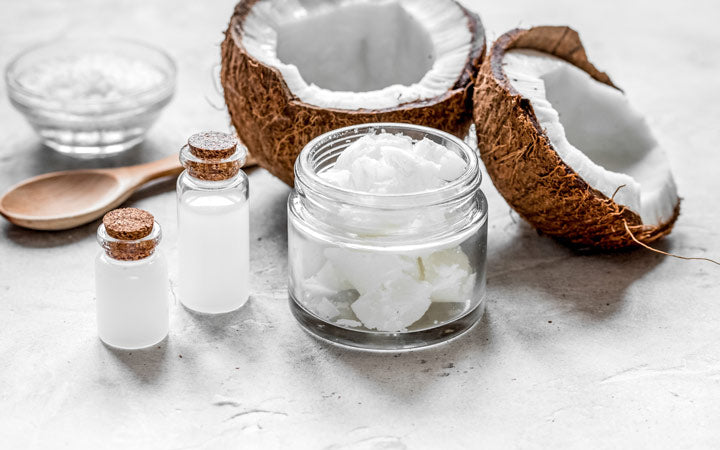Are you looking for a suitable alternative to over-the-counter creams or lotions for treating your eczema? You should try plant based essential and medicinal oils!
Most essential and medicinal oils contain anti-inflammatory properties that can manage the symptoms of eczema like dry and scaly skin, redness, intense itching, etc.
But before you try oils for any type of eczema, it’s important to know the risks, correct usage and potential benefits. Let’s delve deep to know more.
Highlights:
How To Use Essential & Medicinal Oils?
Essential and medicinal oils are concentrated extracts from plant based sources, obtained through cold pressing or distillation. [1]
Some of these oils are mild and can be applied on your skin directly. However, most essential oils are strong and have active ingredients that might irritate sensitive skin. These essential oils have to be diluted in carrier oils before using.
Some plant based oils such as sweet almond oil, avocado oil or coconut oil can be used as carrier oils to dilute essential oils.
Precautions To Be Taken While Using Essential Oils
You may develop allergies, inflammation or other undesirable reactions to certain essential oils. Also, some essential oils are cross reactive; which means they interact with certain medications. Thus, you should be extra cautious if you are already using other medicines for eczema.
It is always important to consult your doctor before starting to use an essential oil for treating your eczema.
Prior to using an essential oil, you can perform a dab test by applying a small amount of oil to an unaffected area of your skin. If you develop any redness, rashes or allergy like symptoms, avoid using that particular essential oil.
Common Oils Used For Eczema
1. Coconut Oil

Coconut oil has been used since time immemorial for moisturising and soothing skin. [2] It is high in lauric acid, which makes it anti-bacterial, anti-inflammatory and rich in antioxidants. This makes coconut oil a gentle solution for treating your dry, itchy skin caused by eczema, while keeping infections at bay. [3]
To use coconut oil, you simply need to rub a small amount between your palms and apply to the affected area. You can leave it on if you are staying indoors. However, it might attract dust and other pollutants if you're stepping outdoors.
Coconut oil can also be used as a carrier oil to dilute other essential oils that cannot be applied directly to your eczema-affected skin. You should opt for cold pressed or virgin coconut oil that are free of harmful chemicals to prevent further irritation on your skin.
2. Tea Tree Oil
Also known as melaleuca oil, tea tree oil is obtained from the tea trees found originally in the Australian swamps. [4] This oil was traditionally used by the Aborigines (indegenous inhabitants of Australia) as a herbal medicine to treat a plethora of skin issues, right from insect bites to fungal infections.
Tea tree oil has excellent anti-microbial properties, effective in fighting off bacteria, fungi and viruses. It helps to fend off infections caused due to the damaged skin barrier that results from eczema. Also this oil has anti-inflammatory properties, which helps soothe redness and irritation on your skin. [5]
Undiluted tea tree oil has active ingredients that may irritate your eczema affected skin if used topically. Hence, dilute it in an appropriate carrier oil such as coconut oil or sweet almond oil and use it according to the directions provided with the product.
3. Neem Oil
Neem tree (Azadirachta indica) is widely found in the Indian subcontinent and has been used in traditional Ayurvedic medicine for ages and is known for its multiple benefits. Listed below are a few properties of neem oil which makes it an excellent choice for treating eczema:
- Neem oil has proven bactericidal effects (kills bacteria) which prevents skin infections caused by eczema. [6]
- It has antihistamines, which help relieve allergy-like symptoms such as itching and swelling, which is common in eczema.
- Neem oil is rich in Vitamin E and fatty acids that not only hydrates your dry skin associated with eczema, but also helps repair your damaged skin barrier.
- It is anti-inflammatory (reduces redness and swelling) as well as analgesic (reduces pain caused by itching bruises).
However, remember that neem oil is very potent and should be used carefully while applying on sensitive skin. Consult a doctor to know the correct dosage and usage.
4. Flaxseed Oil
This oil is obtained by cold-pressing the nutrient-rich flaxseeds. Flaxseed oil has a high content of ALA (alpha-linolenic acid) which is an omega 3 fatty acid, beneficial for your skin’s health. It promotes your skin repairing process, moisturizes and reduces inflammation. It is ideal for treating eczema.
Flaxseed oil can be used both for topical application as well as oral ingestion to help manage eczema. However, flaxseed oil may get contaminated with toxins, if not extracted properly. So take necessary care while extracting flaxseed oil for eczema treatment. [7]

5. Lavender Oil
This aromatic essential oil is extracted from the flowers of the lavender tree and has a number of medicinal effects. It is anti-inflammatory and analgesic that helps soothe your irritated skin. It also has antibacterial and antifungal properties that prevent secondary infections in your skin.
You can either directly apply lavender oil on the affected area or mix it with other essential oils such as tea tree oil for effective treatment of dermatitis. For children, you can also use lavender oil in lukewarm bathing water, after consultation with a doctor.
6. Eucalyptus Oil
Derived from the eucalyptus tree, this essential oil has a high content of cineol or eucalyptol, which has potential therapeutic benefits. Different varieties of eucalyptus oil are available in the market depending on the species from which the oil was extracted.
Eucalyptus oil has anti inflammatory and antimicrobial properties which can relieve you from severe episodes of rashes or flare-ups. You can apply a small amount of the oil in the affected areas to help heal cracks in your skin and prevent infection.
7. Almond Oil
Sweet almond oil is a mild, non-greasy oil rich in vitamin E, healthy fatty acids and other skin friendly phytochemicals (plant based nutrients) that promote your skin’s health in multiple ways. Because of its high lipid content, almond oil is an excellent emollient that locks the moisture in your skin. Hence, it is helpful for people with eczema.
It is antipruritic; it prevents itchiness associated with eczema. It also helps improve your skin barrier function. You can apply it straight to your skin.
Almond oil is safe for all skin types. However, if you are allergic to nuts, avoid using it.
8. Castor Oil
This heavy oil extracted from the castor beans has been used traditionally for a variety of medical purposes. The skin friendly benefits of this oil is not only limited to being an excellent moisturizer. It also soothes inflammation, helps wounds heal faster, and has antimicrobial properties.
You can use castor oil to soothe your eczema flare-ups. Castor oil being thick is not readily absorbed by your skin. For best results, leave it overnight or dilute it with another lighter oil for better absorption.
9. Calendula Oil
Calendula oil is extracted from the marigold flower, which lends its bright yellow colour to this oil. This oil is often used in eczema rashes as it has multiple anti-inflammatory components. [8] Besides it also has antimicrobial and wound healing benefits.
Calendula oil is used as an ingredient in many eczema treatment creams. You can use this oil directly on your eczema patches. If you are pregnant or when breastfeeding, avoid using calendula oil or products containing it.
10. Jojoba Oil
Derived from the Jojoba plants, this is more like a liquid wax, which has excellent moisturising and healing properties. [9] It mimics sebum, a natural moisturizer present in our skin and helps heal a variety of skin conditions including eczema.
While it is safe to use this oil topically on your skin, avoid ingestion.
Wrapping Up
Essential and medicinal oils can be the best natural remedy that can potentially control some of your eczema symptoms, moisturize and soothe your skin and reduce inflammation. However, be cautious before trying something new for your skin. Since eczema varies a great deal from one person to another, consult a certified expert to know which essential oil will suit you and how you should use it.
1. https://www.niehs.nih.gov/health/topics/agents/essential-oils/index.cfm
2. https://www.ncbi.nlm.nih.gov/pmc/articles/PMC6335493/
3. https://nationaleczema.org/get-the-facts-coconut-oil/
4. https://www.nccih.nih.gov/health/tea-tree-oil
5. https://www.ncbi.nlm.nih.gov/pmc/articles/PMC1360273/
6. https://www.ncbi.nlm.nih.gov/pmc/articles/PMC6558881/
7. https://www.ncbi.nlm.nih.gov/pmc/articles/PMC5288556/
Recommended Products
Was this Article helpful?
- Least helpful
- Most helpful


 Upto 50% Off
Upto 50% Off





